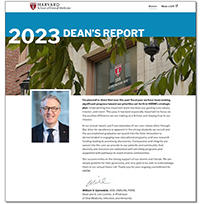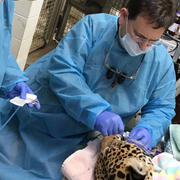
Dr. Steven Spitz’s morning patient had an aching tooth and was desperately in need of a root canal. She didn’t have her usual appetite and was pacing back and forth trying not to focus on the pain. The staff gave her anesthesia and made her comfortable while Spitz and his team took x-rays and began to work on cleaning and shaping the damaged tooth.
This wasn’t a typical day in Spitz’s dental office, today he was treating patients at the Stone Zoo in Stoneham, Massachusetts. His patient Chessie, an 11-year old jaguar, is one of the largest cats and top predators in the western hemisphere, with teeth up to 100 millimeters long. For Chessie’s procedure, Spitz was joined by his clinical assistant, two associate veterinarians, and eight animal care professionals to ensure everything went smoothly during the two-hour treatment.
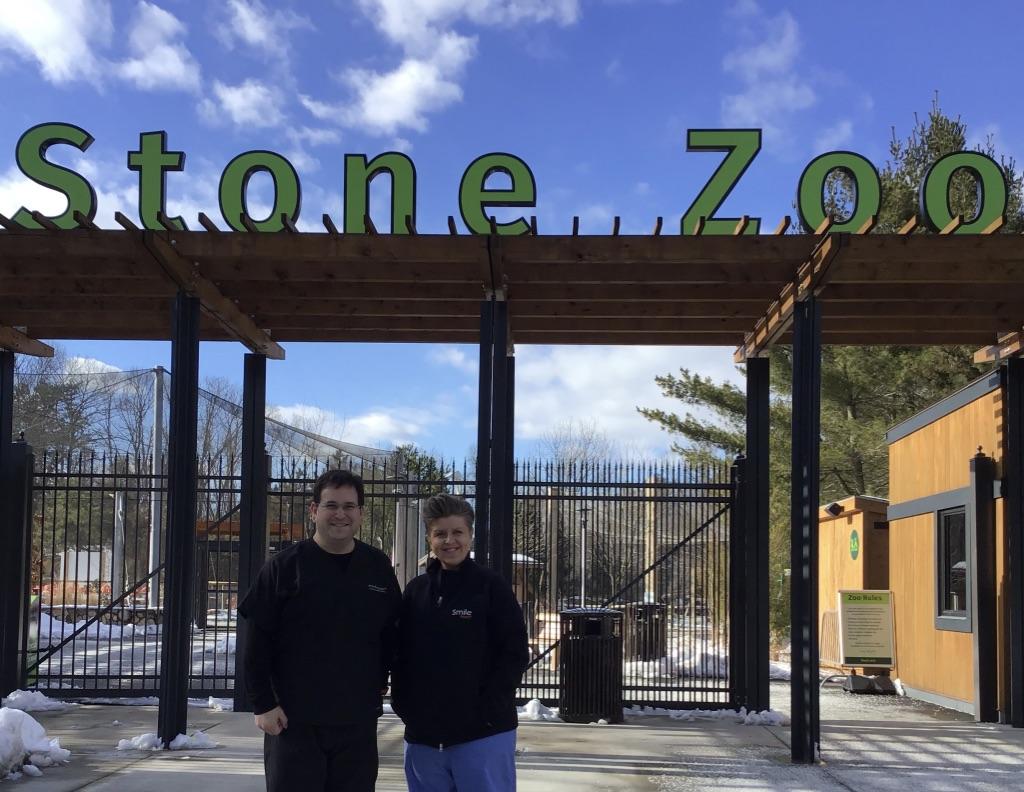 Spitz’s path from Harvard School of Dental Medicine’s prosthodontics program to dentist to the animal kingdom’s most exotic species began with a suggestion from one of his human patients.
Spitz’s path from Harvard School of Dental Medicine’s prosthodontics program to dentist to the animal kingdom’s most exotic species began with a suggestion from one of his human patients.
“About 10 years ago a patient of mine asked me if I had heard of the Peter Emily International Veterinary Dental Foundation,” he said.
The foundation’s mission to take care of animals with severe dental cases — in sanctuaries often underfunded and understaffed for veterinary care — resonated with Spitz a lifelong animal lover, and he signed up to volunteer his services.
“My first experience involved doing root canals on a spider monkey, tiger, and kinkajou at a sanctuary in Georgia. It was an amazing experience working with the animals and talking with the veterinarians who specialize in veterinary dentistry.”
Enthralled by his work at the first sanctuary, he volunteered at others around the country. He was soon asked to be on the Advisory Board, allowing him to share his knowledge of the latest human dental treatments and techniques with veterinarians at the annual Veterinary Dental Forum.
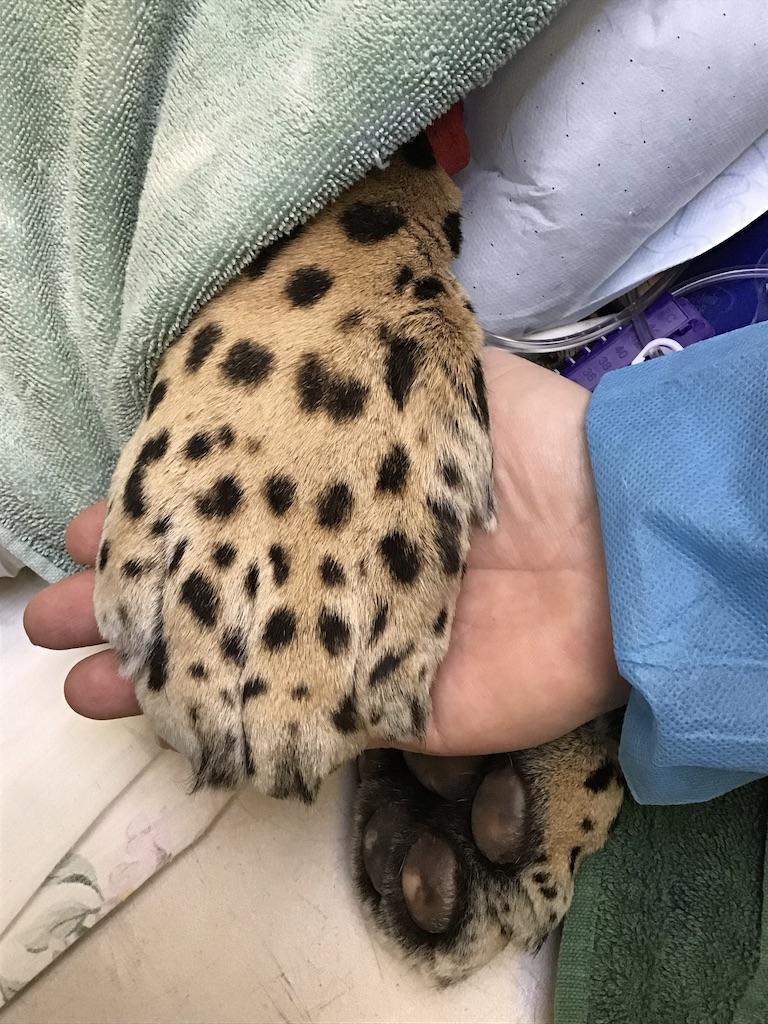 Spitz was eventually introduced to the president of Zoo New England where he is now the dentist on-call for the Franklin Park and Stone Zoos. He volunteers his time regularly to treat animals of all sizes and species— from a small potto, a 12-inch primate with a fractured tooth, to a bush dog in need of four root canals. His experience has come full circle from a childhood dream.
Spitz was eventually introduced to the president of Zoo New England where he is now the dentist on-call for the Franklin Park and Stone Zoos. He volunteers his time regularly to treat animals of all sizes and species— from a small potto, a 12-inch primate with a fractured tooth, to a bush dog in need of four root canals. His experience has come full circle from a childhood dream.
“When I was five years old if you asked me what I was going to be when I grew up, I would tell you a veterinarian. That dream stuck with me all through college,” he said.
Spitz earned his undergraduate degree from University of Massachusetts Amherst in animal science, however between his junior and senior year he shadowed a dentist and became interested in dentistry, eventually attending Tufts University School of Dental Medicine for his DMD degree and HSDM for his certification in prosthodontics.
“My goal has always been to help people and take the fear out of dentistry,” Spitz said. He opened his practice, Smileboston Cosmetic and Implant Dentistry, over 22 years ago with a team of five and has grown it into a multi-specialty operation with over 20 dental professionals.
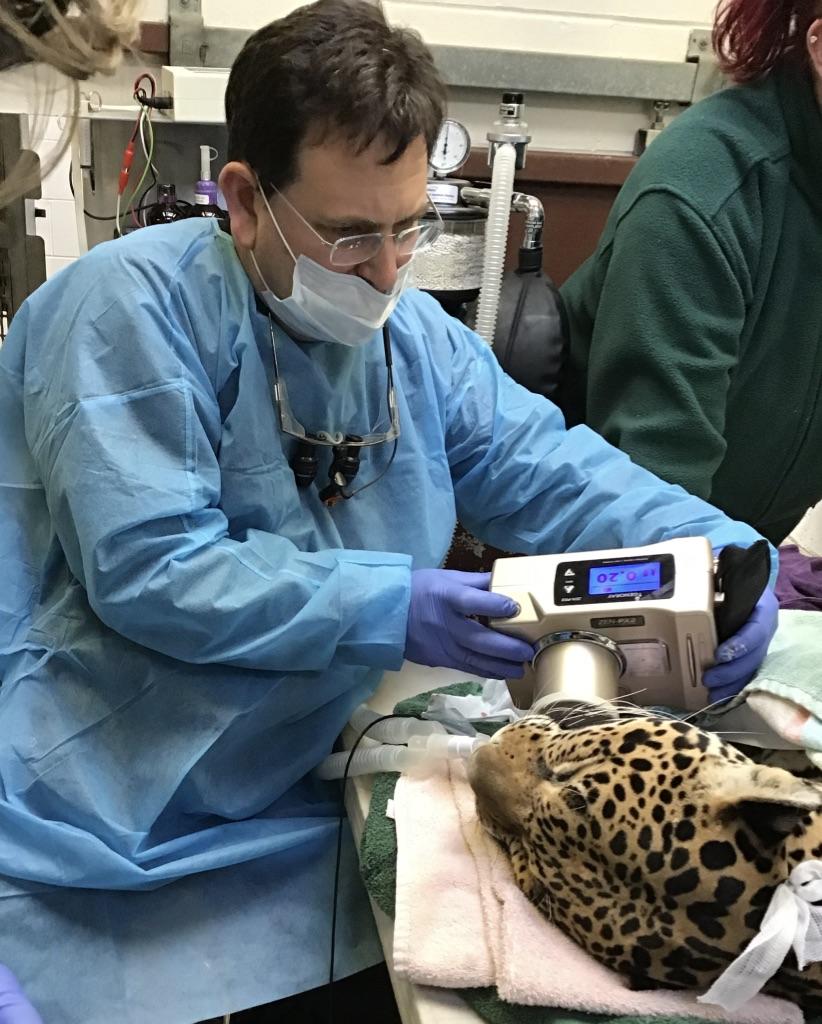 In addition to leading a successful practice and volunteering his time with Zoo New England, he currently serves as International President of Alpha Omega International Dental Fraternity (AO), visiting dental schools and alumni worldwide. He is closely involved in an AO program that provides no-cost dental care to Holocaust survivors living below the poverty line. Spitz is also on the boards of both the Metropolitan District Dental Society and Bright Spirit Children’s Foundation.
In addition to leading a successful practice and volunteering his time with Zoo New England, he currently serves as International President of Alpha Omega International Dental Fraternity (AO), visiting dental schools and alumni worldwide. He is closely involved in an AO program that provides no-cost dental care to Holocaust survivors living below the poverty line. Spitz is also on the boards of both the Metropolitan District Dental Society and Bright Spirit Children’s Foundation.
“I’ve always wanted to make the world a better place than I found it,” he said of his volunteer work and career path. Spitz, who also served as an HSDM clinical instructor earlier in his career, advises dental students to not be afraid to try new things, as he did.
“Keep an open mind and always keep learning. We call it ‘practicing’ dentistry for a reason,” he said.
Spitz certainly follows his own advice, applying lessons learned from one species to another.


